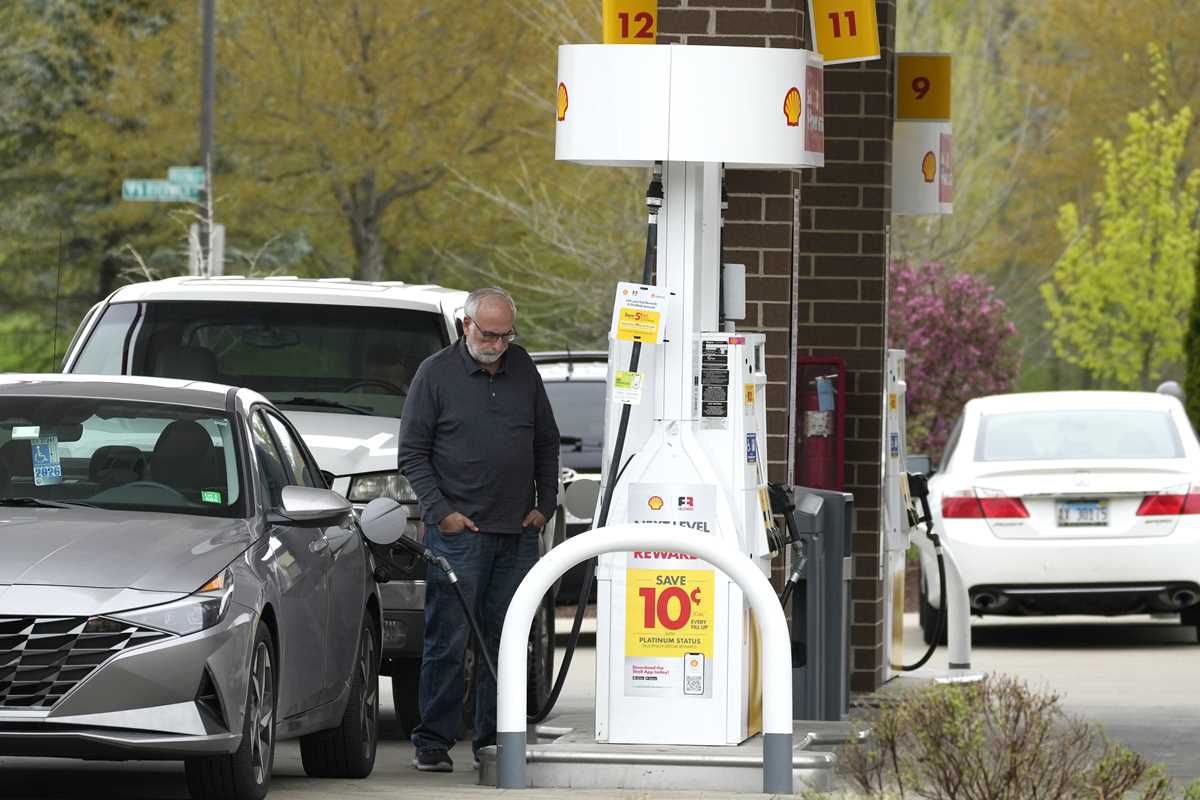 A customer fills up his vehicle's gas tank at a gas station in Buffalo Grove, Ill., Tuesday, April 23, 2024. On Tuesday, April 30, 2024, the Conference Board reports on U.S. consumer confidence for April. (AP Photo/Nam Y. Huh)
A customer fills up his vehicle's gas tank at a gas station in Buffalo Grove, Ill., Tuesday, April 23, 2024. On Tuesday, April 30, 2024, the Conference Board reports on U.S. consumer confidence for April. (AP Photo/Nam Y. Huh)WASHINGTON (AP) — U.S. consumer confidence deteriorated for the third straight month as Americans continue to fret about their short-term financial futures with prices and interest rates still elevated.
The Conference Board, a business research group, said Tuesday that its consumer confidence index fell to 97 in April from 103.1 in March.
The index measures both Americans’ assessment of current economic conditions and their outlook for the next six months.
The index measuring Americans' short-term expectations for income, business and the job market tumbled to 66.4 from 74 last month. That's the lowest reading since July of 2022. A reading under 80 can signal a potential recession in the near future.
Consumers’ view of current conditions retreated to 142.9 from 146.8 in March.
Responses to the Conference Board’s survey showed that Americans remain concerned about high prices, particularly for food and gas.
Consumer expectations of a recession in the next year inched up in April but are still well below their peak in May of 2023.
Overall confidence declined among consumers of all age groups and all income groups with the exception of those earning annual salaries between $25,000 and $49,999.
The number of respondents who said they planned to buy a home or big-ticket appliance also declined, as did the number of those who said they plan to take a vacation.
The recent downturn in consumer confidence comes as most economic indicators show the U.S. economy in very good shape by historical standards, though there have been some signs that it may be tapering.
The nation’s economy slowed sharply in the first quarter to a 1.6% annual pace in the face of high interest rates, but consumers — the main driver of economic growth — kept spending at a solid pace.
Last week’s report from the Commerce Department said the gross domestic product — the economy’s total output of goods and services — decelerated in the January-March quarter from its brisk 3.4% growth rate in the final three months of 2023.
Earlier this month, the government reported that Americans boosted spending at a hotter-than-expected pace in March, underscoring how shoppers’ resiliency despite inflationary pressures and other economic challenges.
Retail sales rose 0.7% in March — almost double what economists had forecast — after rising 0.9% in February, according to the Commerce Department.
Another indication that the U.S. economy remains strong: the labor market continues to churn out jobs. U.S. employers added 303,000 jobs in March with the unemployment rate ticking down to 3.8%. It was the 26th straight month that joblessness has been below 4%, the longest stretch since the 1960s.
The Labor Department issues its April jobs report on Friday, with economists forecasting that employers added a solid 230,000 jobs.
Before you make your next trade, you'll want to hear this.
MarketBeat keeps track of Wall Street's top-rated and best performing research analysts and the stocks they recommend to their clients on a daily basis.
Our team has identified the five stocks that top analysts are quietly whispering to their clients to buy now before the broader market catches on... and none of the big name stocks were on the list.
They believe these five stocks are the five best companies for investors to buy now...
See The Five Stocks Here
Growth stocks offer a lot of bang for your buck, and we've got the next upcoming superstars to strongly consider for your portfolio.
Get This Free Report